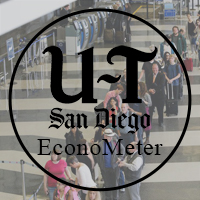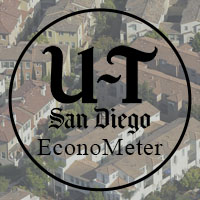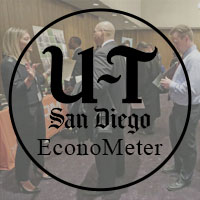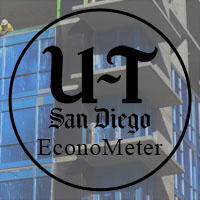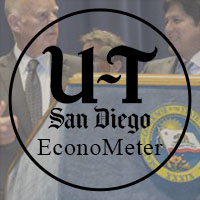To EconoMeter panel: Privatize airport screening?

Q: Would the travel economy benefit from privatizing airport security to reduce wait times?
Bob’s Answer: YES
TSA was an ad hoc creation in the post-9/11 world that while a good idea in theory, demonstrates why government is not as effective as the private sector be it poor service, lack of effectiveness or waste. Travel is a critical part of our economy and would benefit from a welcome approach to travelers while ensuring security under proper government oversight.
Online sales: A bummer for stores and economy?

The Associated Press” width=”560″ height=”307″ />
People attend Shoptalk, a retail and technology conference in Las Vegas, earlier this month. What’s the future of the physical store? That was one of the big topics of a three-day conference called Shoptalk, which attracted more than 3,000 people from a broad spectrum of the retail world, including stores, suppliers and venture capitalists. The Associated PressQ: Is there an economic downside to shifting sales from stores to online websites?
Bob’s Answer: NO.
Those places that are entertaining and provide an experience that allow people to “shop the mall” are staying vibrant.
Today’s consumers yearn for and will continue to visit those high energy, unique shopping places.
Locations where people simply go to the store to purchase commodities are feeling the real brunt of that online competition. Hence, the ultimate shift is from mid-market, commodity driven department stores to online.
EconoMeter panel: Are tightened trade policies bad for the economy?
Q: Would the U.S. economy be endangered by imposing higher tariffs and other trade restrictions?
Bob’s Answer: YES.
From Adam Smith’s “Wealth of Nations” written over 200 years ago, free trade makes sense for increased economic growth, more dynamic investing and direct foreign investment.
Although opponents question the impact on domestic jobs, free trade ultimately benefits all parties and protectionism ultimately harms the people it is intended to benefit.
Parental leave policies change to accommodate needs
With employee satisfaction and retention a top priority in the hotel industry, companies are making parental leave policy changes to reflect what their workers want.
REPORT FROM THE U.S.—Corporate parental leave policies have come into the spotlight in the past year, as companies expand their allowances to include more time off and less-strict definitions of who can take leave.
It’s happening in the hotel industry as well. Hilton Worldwide Holdings changed its parental leave policy this year. The new benefits give birth mothers an additional eight weeks of paid maternity leave, increasing the amount of fully paid maternity leave from two weeks to ten weeks.
The new policy also states that fathers and adoptive parents, who previously received no paid leave, now receive two weeks of paid leave.
Hilton’s announcement about its more generous parental leave policies came on the heels of similar proclamations from big-name companies like Netflix, Microsoft, Adobe, and Goldman Sachs, but Hilton’s changes are particularly newsworthy as the policy extends not just to its salaried workers, but also its hourly workers, who make up 75% of the 40,000 employees at Hilton’s corporate offices and owned and managed properties across the U.S. who are affected by the policy.
“We recognized an opportunity to make significant enhancements to our parental leave benefits that would reach all levels of the company, including our hourly team members,” said Matt Schuyler, Hilton’s EVP and chief human resources officer.
Schuyler said staff feedback provided the biggest impetus for the change, which was a way to provide even more support and flexibility to employees and their families.
“We frequently ask our team members for feedback and suggestions on the programs and benefits that we offer,” he said. “And through our survey results, we recognized that the one area that matters most to them is flexibility.”
Michele Sarkisian, president and CEO of P3 Advisors, an Atlanta-based consultancy that deals with human resources issues, said more and more businesses are taking their employees’ needs to heart.
“Companies are paying attention to what their employees want and need to be productive and fulfilled,” she said, “particularly as the ‘war for talent’ continues to grow as our employment rate has improved.”
Schuyler said the ability to hire and keep top-rate workers is a welcome bonus.
“By providing industry-leading benefits in the areas that matter most to our team members, it helps us attract and retain great talent,” he said.
Robert Rauch, CEO of RAR Hospitality, which oversees two Hilton properties in San Diego County, California, said the policy was a landmark decision for hotel employees.
“The importance of this policy is paramount as our company’s culture promotes an environment that balances the family-work predicament so many of us face on a daily basis,” he said.
The bottom line, though, Sarkisian said, is the policy change significantly improves employee satisfaction.
EconoMeter panel: The high price of less homebuilding

Q: Does San Diego’s low production of housing pose a threat to the health of the local economy?
Bob’s Answer: YES
But the real problem is housing affordability and the restrictions on housing development in our region. We do not build nearly enough housing to keep up with demand and, if we want to attract and retain new workers, we need to provide units for them to live in.
The Chargers, Convention Center and Taxes: A Primer
This is one man’s opinion. I am an Independent, so Democrats and Republicans alike will disagree with me. I am not a member of the Lodging Industry Association or the San Diego Hotel Motel Association, so I am not privy to their positions on these issues…
To EconoMeter panel: Lower jobless claims, higher wages?

Q: Do dropping jobless claims portend greater pressure to raise salaries?
Bob’s Answer: No.
Wage growth since 2009 has been very low and while the combination of the minimum-wage increases and the unemployment report will have a positive impact on wage growth, salary pressure will only truly increase when the economy picks up steam later in the second quarter. Given this is an election year, chances are good for a strong finish for 2016. The unemployment report is flawed in that it does not include those no longer looking for work.
Rising rents bad for economy?
EconoMeter panel considers the impact
Q: Are rising rents in San Diego County bad for our economy?
Bob’s Answer: No.
Rents as a percentage of income are lower in San Diego than in other areas of California and rising rents are being outpaced by higher wage growth by a wide margin.
The economy will only become impacted if rental rate increases outpace the level of wage increases.
Given the recently passed statewide minimum wage increase of over 8 percent annually over the next 6 years, that will not happen!
Minimum wage at $15/hour: Economic boon to San Diego?
Q: Will San Diego County’s economy benefit from an increase in the minimum wage to $15 over the next six years?
Bob’s Answer: No.
This additional 50 percent increase in wages over the next six years, a compound annual increase of 8 percent, will lead to layoffs and price hikes as well as force some employers to close their doors. Minimum-wage increases hurt the people they’re supposed to help.
Students and first-time workers really need a training wage or they will not get that first job.
The bottom line is this will hurt the economy, not help.





